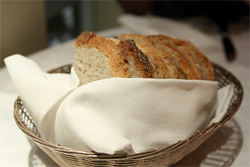It was bad enough when pizza places started charging for delivery. It got worse when JetBlue had the nerve to demand $7 to rent a pillow. Now, all across the land, restaurants have begun making their patrons pay for the bread they once enjoyed for free. The butter, too. In some establishments, even filtered tap water now commands a fee. Has there ever been a worse time to be alive than this ungracious, penny-pinching era?
Well, yeah. Today, we may have to pay for our handcrafted Pugliese before we can eat it, but we also feast on whole-grain MP3s, moist and chewy New York Times op-eds straight from the oven, and hearty artisanal porn, all gratis. Unless your appetite is so prodigious that United Airlines charges you for three seats when you fly, you are much, much better off than you were in the days when bread was free and everything else cost money. And yet it still galls, doesn’t it, when the waiter shows up at your table with nothing more than a sense of fake intimacy and a tip about the herb crusted loin of bison with King Trumpet mushrooms?
A complimentary sweet batard, a warm blanket offered in the midst of a transcontinental flight — these simple gestures of goodwill can make even the least celebrated among us feel, for a moment at least, like a celebrity. Even though those bonus loaves of pain au levain may fill us up so much we decide to pass on an appetizer or dessert that would add to the bill, and thus the tip, servers bestow these gifts upon us anyway. Sabotaging their own best interests, they do whatever they can to make us feel courted, cared for, at home. Surely we must be extraordinary beings to inspire such devotion!
For actual celebrities, of course, the entire universe is a bottomless bread basket of savory goodies. While the rest of us make do with spongy ingots of bland, giveaway focaccia, they gorge on free designer dresses, free sports cars, free skin cream, free vacation cruises, free bed linens, free bracelets, free teeth-whitening vouchers and, one suspects, lots and lots of actual bread. Most of those guys you see hanging around Britney Spears all the time probably aren’t paparazzi — they’re deliverymen from L.A.’s finest restaurants, keeping Spears and her entourage supplied with banana green curry bread and chorizo challah.
Is it any wonder celebrities are so altruistic? Ultimately, it doesn’t matter how shallow or self-absorbed you are — getting stuff for free inevitably makes you a better person. When you obtain something without paying for it, you experience all the usual pleasure of acquisition but none of the pain. There’s no sense of risk, no buyer’s remorse – you didn’t pay anything, you got it for free! In February, two million people around the country took advantage of a free Grand Slam breakfast offer at Denny’s — not because it made good economic sense to spend an hour waiting in line for $5.99 worth of bacon and eggs, but rather because it just feels so good getting something for free. And when you feel good, you feel benevolent. Every time a celebrity is given a complementary couture iPod case or a case of fruit-infused vodka, a Malawi orphan’s future brightens.
On a less glitzy but exponentially larger scale, the same dynamic plays out with free bread. There are more than 200,000 sit-down restaurants in the U.S., serving tens of millions of meals a day. Imagine if, suddenly, they all started for charging for every slice of ciabatta, every tomato and basil dinner roll. Never mind filling our bellies – how would we affirm our self-importance without these tasty offerings to signify our worthiness? What would happen when our appetites for altruism and reciprocity were no longer whetted by several hundred calories of flour, yeast, and salt? Slowly, self-doubt would afflict us. Were we no longer worth even the occasional stale bun? We’d grow surly, self-absorbed, indifferent to the fates of our waiters, our parking attendants, even our friends and family. Restaurateurs may complain about rising wheat prices, the faltering economy, and their inability to keep subsidizing our free bread habit. But while it may be too costly to keep giving away seeded sourdough rounds and light and airy brioches for free, charging for them could be, in the long run, even costlier. The line between a civil society and chaos is as thin as the golden crust of a top-notch baguette. • 17 September 2009




